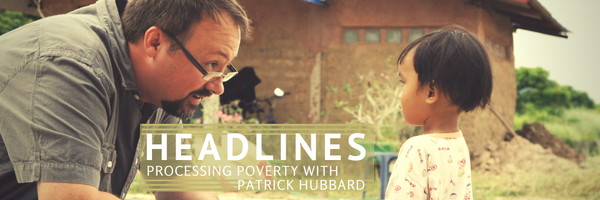
In April I came across an article from The Gospel Coalition blog that I found very helpful and encouraging with regard to our work among the global poor. The article, 4 Ways Satan Uses Christian Generosity for Evil, discusses four pitfalls for giving to global missions. I found the article encouraging because each of the potential problems the author described have been safeguarded against in our comprehensive church planting efforts.
The first issue the writer discussed was second hand clothing donations. In Africa, for example, the second hand clothing business is a thriving enterprise. Since much of the population is poor, local entrepreneurs have built successful businesses selling clothing secondhand. Imagine the devastating consequences to their businesses when well-meaning foreigners donate huge quantities of second hand clothing. Why buy from someone what you can pick up for free? This is devastating to the clothing business owners and can result in long-term harm to the villages the foreigners are trying to help.
At Living Bread we realize this is a problem when working among the global poor, therefore we invest in the communities we are trying to reach with our church planting efforts. Every church we plant operates a feeding ministry of some type. The food we distribute is always purchased from local markets. Rather than potentially taking customers from these markets we are investing in local businesses by purchasing their food to serve in our feeding ministries. The people we serve are not spending much in these markets since they are going hungry, but our purchases bring resources to the community.
In addition, our Share Christmas project provides school supplies and uniforms (where required) for students to get an education. Share Christmas is not as popular with American donors as some similar programs. We’ve found this is due in part to the donor not experiencing the joy of purchasing the physical items to be given. Instead, we collect $15 which we use to equip a local church to purchase the supplies locally and assemble the gifts themselves. In our model, the local church gets to experience the joy of meeting a need in their own community.
The spread of fake orphan care is the second issue discussed in the article. The unfortunate reality is that some people send their children to various organizations to participate in multiple sponsorship programs. Living Bread does not operate an orphan sponsorship program, nor do we operate orphanages. We do help orphans and poor families with feeding, medical, educational, and community development ministries. Everything we do is executed by our church plants in their community. The church knows the specific needs of the community because it is made up of community residents. They both know the real needs and know when help is being abused. Often, church members hear that drug addicted mothers are selling the food they are given by the church to buy drugs. One solution we have implemented in these situations is to give the food to a member of the church who prepares meals for the hungry children, to make sure they are being fed. Our vision for empowering the local church provides a necessary safeguard to abuse.
The third pitfall is much like the second, but it involves indigenous pastors rather than orphans. Some indigenous pastors or third parties will connect pastors to various Western organizations for support. These organizations all believe they are the sole providers of support for these pastors. Living Bread protects against this because we have established indigenous led non-profits that oversee and help support all of our work. These organizations are led by pastors and lay leaders who know the communities and local church leaders. Every Living Bread church planter comes to us through this network and is exclusively supported as a church planter with Living Bread.
The final problem area discussed in the article is West-Endorsed Kingpins. Most Western missionaries are godly people who are fulfilling God’s call upon their lives. However, there are some who live luxurious lifestyles and some who also exaggerate their effectiveness to raise support. We know of at least one case where an American missionary was sending reports to their denominational leaders taking credit for work that Living Bread was doing. These Kingpin missionaries often gain undue authority over nationals because it is assumed their material blessings mean the Western Church is firmly behind them. This authority can be, and often is, abused.
Living Bread does not send Western missionaries to do the work of church planting among the global poor. We fervently affirm the important role of Western missionaries, but we believe church planting in needy communities is best done by people from the community. Each of our church planters come from a community similar to the one they are working in, and they all live in the community where they minister. There are no gated compounds or luxurious vehicles giving them an undue authority over the people they are trying to reach. No one is making false professions in hopes of receiving material rewards from them.
Over that past thirteen years I have worked among the global poor on three continents and I have seen each of these four pitfalls play out many times over. One way the Western Church has attempted to deal with them is by refusing to give resources to nationals. I do not believe this is the best solution. It creates an entire new set of pitfalls and problems, not the least of which is the almost non-existence of church planting efforts among the global poor. I believe we have addressed each of these problems in a way that provides a better alternative.
For information on ways you can partner with us, and by doing so partner with the poor we serve, visit our giving page: LivingBread.org/give
Patrick Hubbard has an extensive business and ministry background. He worked in the hospitality industry as a General Manager and as a Regional Manager. Along with his wife Bárbara, he is part owner of Freegrance Products LLC, a social enterprise seeking to empower women to escape poverty and avoid human trafficking. Patrick and Bárbara are also the founders of Living Bread Ministries where they have committed over thirteen years to comprehensive ministry among the global poor. He has also served as a staff member of a local church. Patrick holds a BS in Religious Studies and a MA in Global Studies from Liberty University. He is currently pursuing a MBA from Old Dominion University.
has an extensive business and ministry background. He worked in the hospitality industry as a General Manager and as a Regional Manager. Along with his wife Bárbara, he is part owner of Freegrance Products LLC, a social enterprise seeking to empower women to escape poverty and avoid human trafficking. Patrick and Bárbara are also the founders of Living Bread Ministries where they have committed over thirteen years to comprehensive ministry among the global poor. He has also served as a staff member of a local church. Patrick holds a BS in Religious Studies and a MA in Global Studies from Liberty University. He is currently pursuing a MBA from Old Dominion University.

